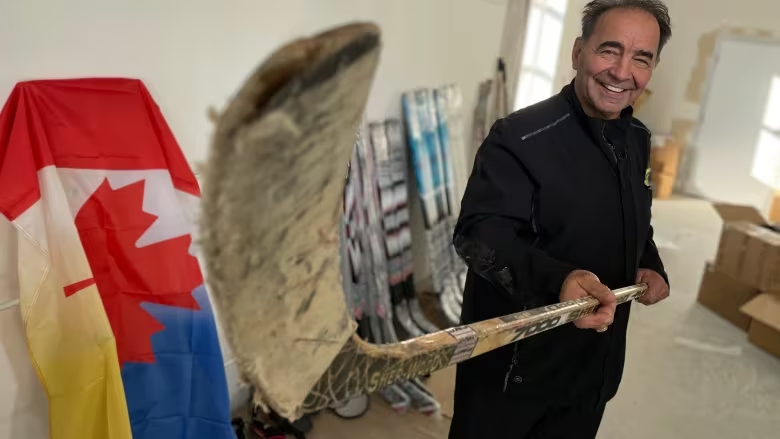Former NHL player Wayne Babych is part of Canadian Friends of Hockey in Ukraine. The group collects hockey gear to send to players in Ukraine, as well as newcomers to Canada. (Jaison Empson/CBC)
Former NHL player Wayne Babych isn’t letting bombs, blackouts and families fleeing war stop children in Ukraine from playing hockey.
“This is sort of a dream for them, but the avenue is not there … they have no access to equipment,” said Babych, who played for the St. Louis Blues, Pittsburgh Penguins, Quebec Nordiques and Hartford Whalers.
Babych, who has Ukrainian heritage, is part of a group called Canadian Friends of Hockey in Ukraine (CFHU), which has been around for the past five years, but has been extra busy since Russia invaded Ukraine nearly one year ago.
The group has been gathering hockey equipment to send to children in Ukraine who are still keen to play.
It’s fundraising to buy new gear, plus soliciting donations from individual hockey families, teams, the National Hockey League Players’ Association (NHLPA) and hockey equipment manufacturers, such as CCM.
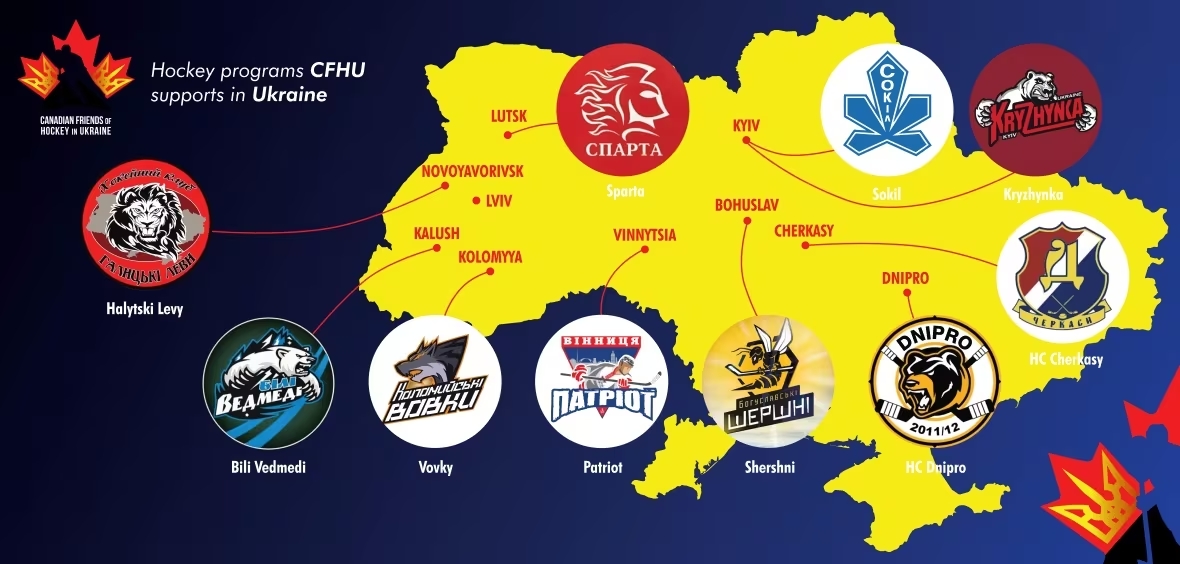
“Our dad, who just left us a couple of years ago, he always stressed that don’t ever forget where you came from, and it’s kind of a big tool for us,” Babych said recently, as he looked through donated gear in a warehouse in Winnipeg’s Exchange District.
His younger brother, Dave, played for the Winnipeg Jets and is now an ambassador with the Vancouver Canucks. He is also involved in CFHU.
“We’re not going to turn our back to these people,” Babych said.
Mental health and a reason to stay
Taras Dumych, a CFHU volunteer helping to organize the distribution on the ground in Ukraine, says the players and their families are thrilled to receive the equipment because, just like in Canada, hockey is a very expensive sport.
“They’re extremely happy. Extremely happy. Particularly that they know that people in a faraway Canada care about them,” he said recently from his home in Irpin, on the outskirts of Kyiv, during an evening blackout.
One of the most recent shipments was distributed to players, aged six to nine, in the Sokil Kyiv Hockey School. Affiliated with the Sokil Kyiv professional team, it is one of the oldest hockey schools in Ukraine, training players all the way up to the junior leagues.
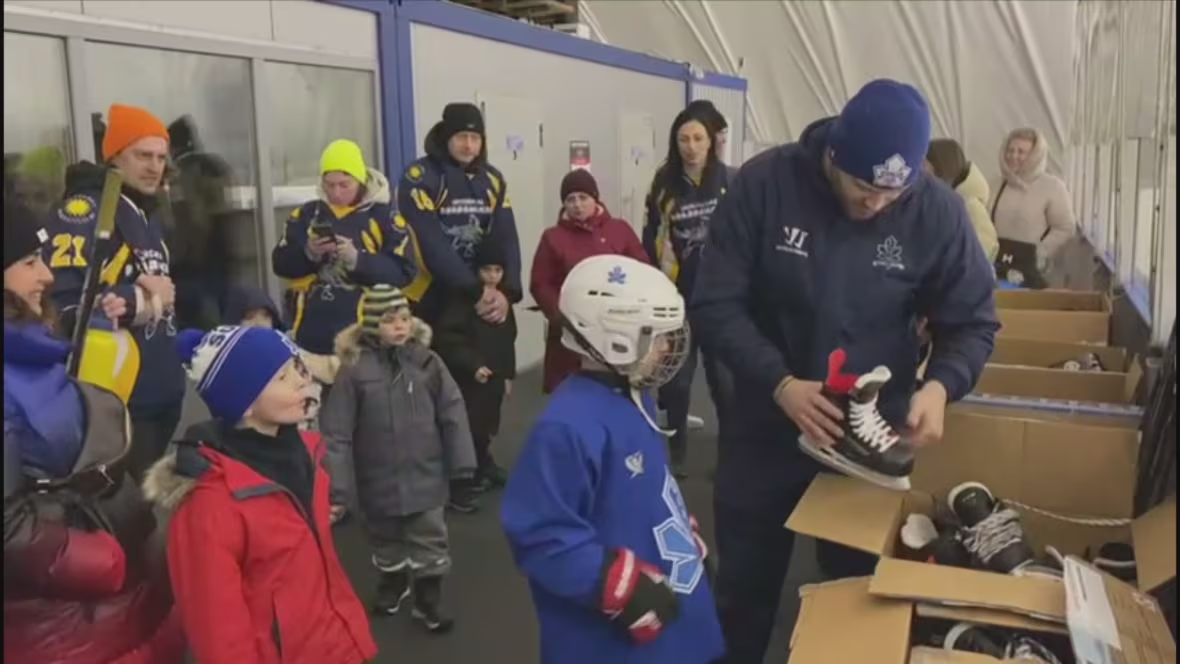
Marina Fedotova’s two sons, Klim Trukhin, 9, and his seven-year-old brother, Korniy Trukhin, received gloves, pants and other protective gear.
“It was really like the present was from Santa and it looked like that: ‘Let me see, let me touch, I like this one.’ Like kids who open the box of presents on Christmas Day,” she told CBC News.
Fedotova says it’s important that children can continue doing the things they enjoyed before the war started, so their lives don’t stop — but it’s hard.
“We really think twice or three times [when] we want to spend the money,” she said. “Sometimes you need to say no … but it’s the last thing that I want to do.”
And while some might question the value of sending hockey gear when weapons and ammunition are more important for Ukraine’s survival, Fedotova said this donation of equipment has really impacted her boys.
“They now understand and they see it from their own eyes that the world will support them as well.”
WATCH | Ukrainian hockey players receive Canadian gear:
Watch young players from the Kyiv Sokil Hockey School receive equipment from the Canadian Friends of Hockey in Ukraine. Organizers and parents say it’s an important way for life to be as “normal” as possible, despite the war with Russia.
Dumych says they may seem trivial, but said such donations help families maintain some normalcy despite the war, and provide a physical and mental health outlet for children. It’s also a reason for some families to stay in Ukraine, which is important for the ongoing functioning of the country, as well as its future.
“Even in a peaceful time, you know, when you are busy with something and this is the way to deal with stress,” he said.
“It’s extremely important now, particularly that we want our kids to remain in Ukraine, although it’s certainly dangerous. But [for] those who cannot go abroad and if they want to play hockey, we need to support them.”
He says the players come out whenever it’s safe, whenever the power is on. Some rinks are also outdoors now that the weather has turned cold.
“The rinks do operate, because it’s — thank God — not all the time we are short of power. But indeed, today, it’s been a very difficult day. We actually had the missiles flying over,” Dumych said.
“But, you know, we are holding on. Our motto now in the country is that we are holding on because we are Ukrainians. We have our country and our faith. And so we will not give up. We will not give up, neither in this war nor in our sport.”
‘His eyes light up’
Back in Canada, members of CFHU are also outfitting young Ukrainians who have come here to escape the war.
They include children like nine-year-old Yehor Bieliaiev, who plays defence for the U11 A3 Winterhawks Red in Winnipeg. He received a helmet, stick and some protective gear. He brought his skates with him from Ukraine when he arrived with his mother March 31.
“Thank you so much,” he said at a recent practice. “It’s [a] fun game.”
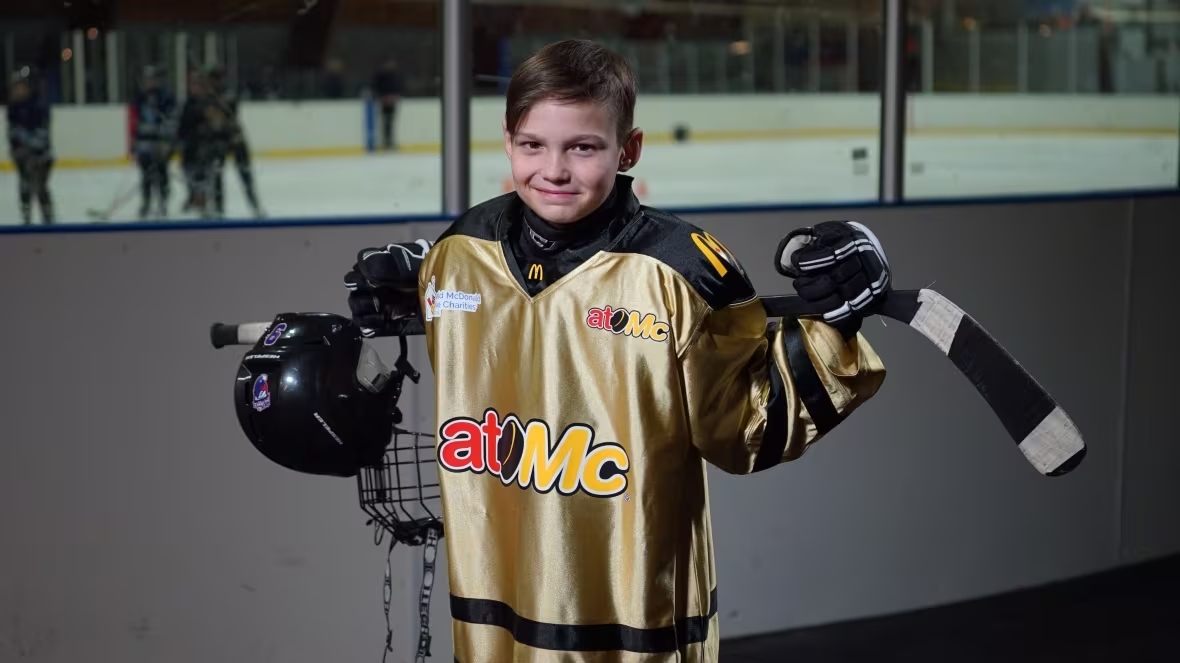
His mother, Natalia Bieliaieva, is here without her husband. He is working and volunteering, cooking for the military and migrants and delivering humanitarian aid to orphanages and hospitals in western Ukraine.
She says it’s been hard to navigate her new life and job and Yehor’s school.
The hockey system is so different from Ukraine, so she is grateful the group helped outfit her son and even covered part of his registration fees.
“I’m happy that he has this opportunity. I see that he’s happy, he has fun, he enjoys and every day he becomes more comfortable,” she said, adding she sends photos and videos home to her husband.
“His eyes light up and he can do what he loves to do.”
Babych says that is exactly why he does it.
“When you get the opportunity to look in their eyes and see how grateful they are … you see tears in their eyes because they can’t believe they’re getting this opportunity.”
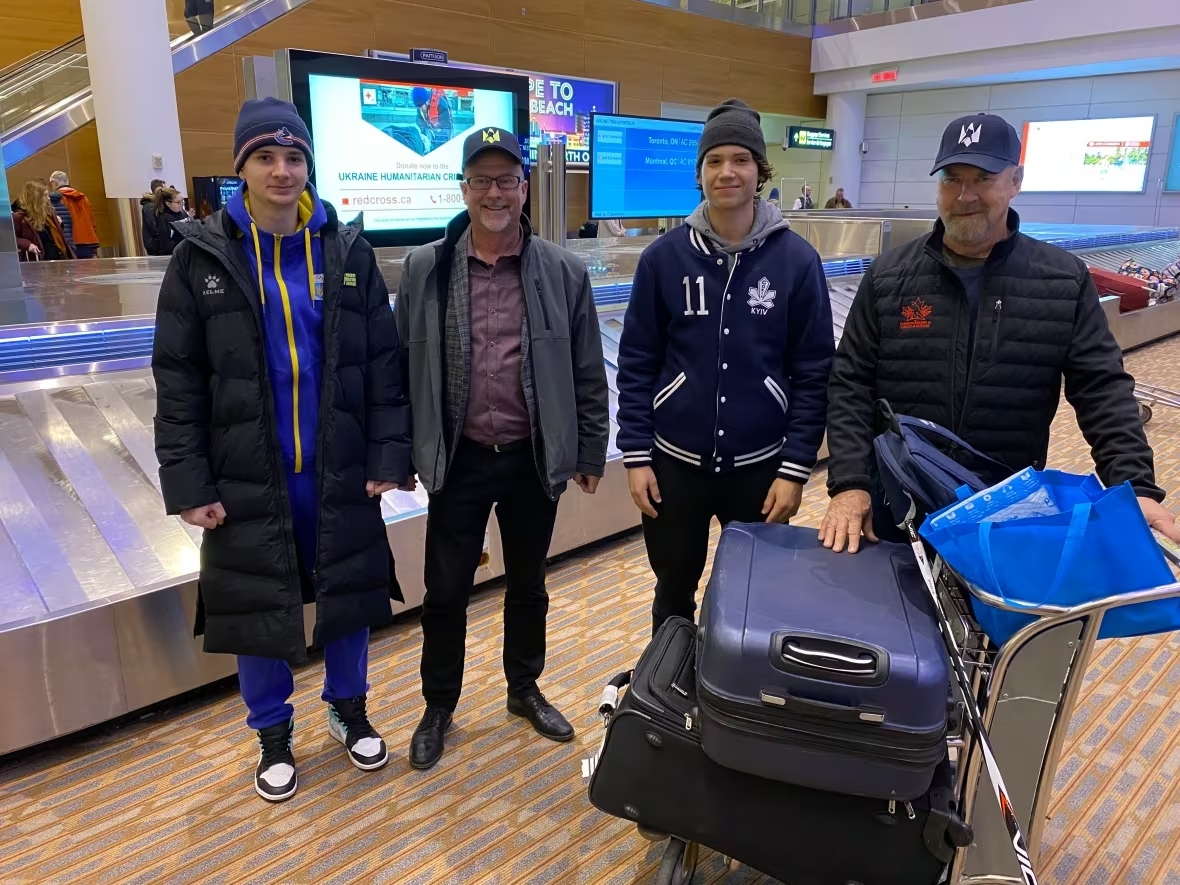
CFHU has also paid airfares for several talented players to try out for elite teams here.
Two of them, Havryil Simchuk, 16, and Dmetro Kurbytskyi 19, landed in Winnipeg several weeks ago, tired from the transatlantic trip, but looking forward to trying out with the Manitoba Junior Hockey League’s Dauphin Kings.
“We are happy to be here,” Kurbytskyi said. He said it was “very hard” to wait out air raid sirens and blackouts when they were trying to practice.
Dauphin is a Ukrainian community that has welcomed more than one dozen newcomer families in the last year, so these players would be a great fit, said CFHU member Vern Zatwarnicki, as he helped the young men gather their gear at the airport.
“We’ve made a very strong connection over the years,” he said.
“Every year Dauphin has an event that’s called Ukrainian night, and it’s gone viral over in Ukraine. And for the longest time, Dauphin Kings was a favorite team in Ukraine. So here they are. They’re going to Dauphin, so lots of community support.”
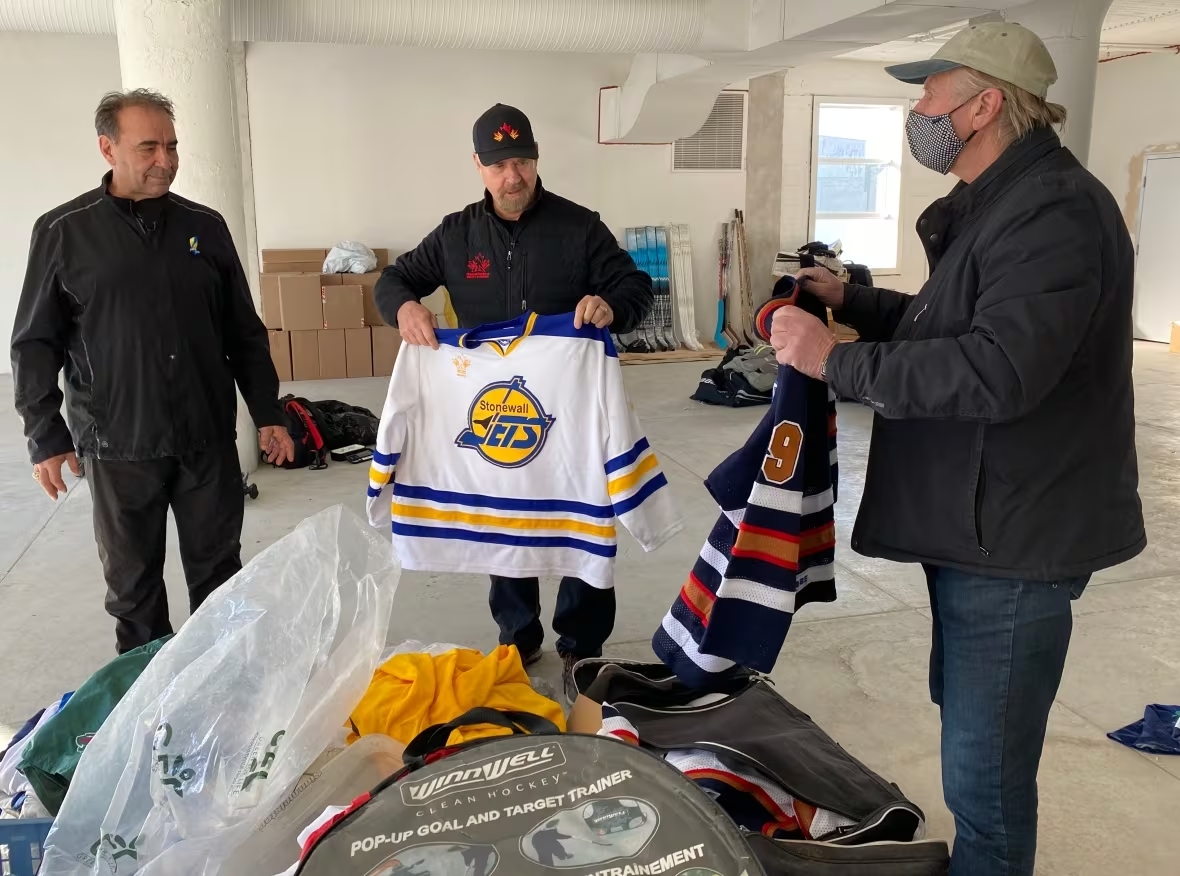
Babych says most of the players he’s spoken to, hope to eventually return to Ukraine.
“Probably more so than ever, they want to represent their country because of what they’re going through,” he said.
Hockey Can’t Stop tour
When Russia invaded last February, some hockey players traded their sticks for guns. Others took up volunteer positions while still others fled the country.
Men aged 18 to 60 are not allowed to leave Ukraine without special permission, but players who made the country’s U-25 national team have received military exemptions to compete in the Winter University Games in Lake Placid, N.Y., from Jan. 12-22.
They are coming to Canada in the next few weeks to play against four Western university teams as preparation. CFHU is supporting and promoting the team as it travels here.
The Ukrainian national team will play against the University of Saskatchewan on Dec. 30, the University of Calgary on Jan. 2, the University of Alberta on Jan. 3, then they will travel to Winnipeg to take on the University of Manitoba Bisons on Jan. 9.
Profits from ticket sales will go to the Canada/Ukraine Foundation, which provides assistance to humanitarian groups in Ukraine and Canada. It will disperse the majority of funds to Save Ukrainian Hockey Dream, a charitable foundation operated by the Ice Hockey Federation of Ukraine with the assistance of the IIHF.

